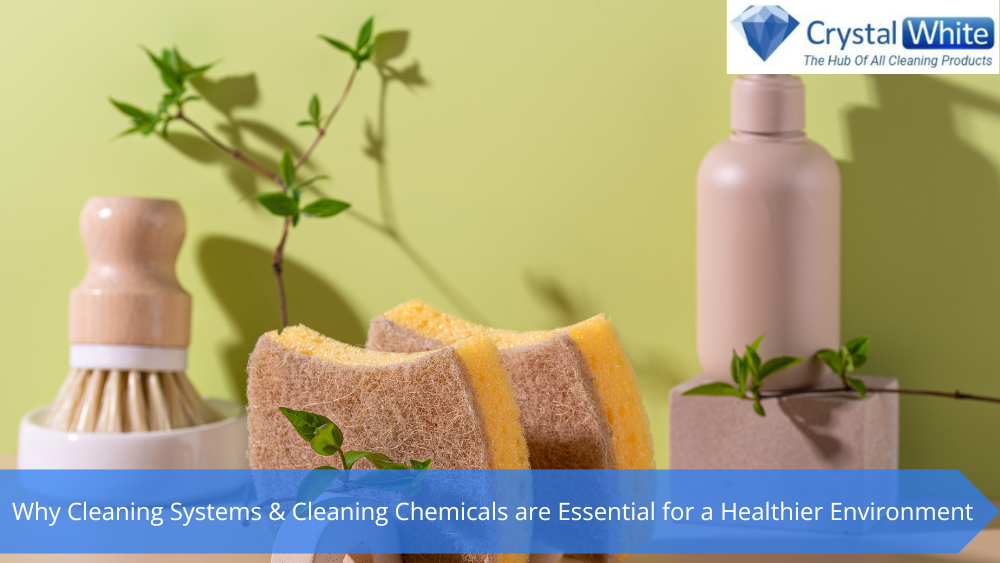
Why Cleaning Systems & Cleaning Chemicals are Essential for a Healthier Environment
The Role of Cleaning Systems in Maintaining Healthier Environments
Effective Dirt and Germ Removal:
- Proper cleaning systems help to remove dirt, dust, bacteria, and viruses from surfaces and the air.
- Regular cleaning using efficient systems ensures that harmful contaminants don’t accumulate over time.
Prevention of Cross-Contamination:
- Effective cleaning systems, such as color-coded tools or disinfectants, help prevent cross-contamination between different areas.
Energy and Time Efficiency:
- Modern cleaning systems are designed to clean quickly and efficiently, saving time and energy for businesses and households.
Why Cleaning Chemicals Are Vital for Health and Hygiene
Antimicrobial and Antibacterial Action:
- Cleaning chemicals, such as disinfectants and sanitizers, kill harmful bacteria, viruses, and fungi, reducing the risk of infection.
Improving Indoor Air Quality:
- The right cleaning chemicals not only clean surfaces but also help eliminate airborne pollutants, contributing to healthier indoor air quality.
Removing Stubborn Contaminants:
- Certain chemicals are formulated to break down and remove stubborn stains, grease, and grime that basic cleaning systems cannot handle.
Key Benefits of Using Professional Cleaning Systems & Chemicals
Reduced Spread of Illnesses:
- Regular cleaning using the right chemicals helps reduce the transmission of germs and diseases, particularly in high-traffic areas like hospitals, schools, and office buildings.
Long-Term Health Benefits:
- Clean, sanitized spaces promote a healthier environment that supports better physical and mental well-being.
Workplace Productivity:
- A clean workspace leads to fewer sick days and a more focused, productive workforce.
Enhanced Customer Experience:
- For businesses, maintaining a clean environment can improve customer satisfaction and trust, especially in sectors like hospitality, retail, and healthcare.
Types of Cleaning Systems for Healthier Environments
Automated Cleaning Equipment:
- Machines like floor scrubbers, vacuum cleaners, and steam cleaners reduce manual labor and increase cleaning efficiency.
Hand-Held Cleaning Tools:
- Mops, microfiber cloths, and other tools help ensure that smaller, intricate areas are thoroughly cleaned.
Air Filtration Systems:
- Air purifiers and ventilation systems help remove contaminants from the air, creating a healthier environment.
How to Choose the Right Cleaning Chemicals for Your Needs
Understand the Specific Purpose:
- Disinfectants, degreasers, and all-purpose cleaners have different functions. Choose products designed for your specific cleaning needs.
Check Safety and Environmental Impact:
- Look for cleaning chemicals that are eco-friendly, non-toxic, and safe for both users and the environment.
Certifications and Labels:
- Choose products with certifications like Green Seal or EcoLogo to ensure they meet environmental and safety standards.
Best Practices for Using Cleaning Systems and Chemicals Safely
Follow Manufacturer Instructions:
- Always read and follow the guidelines on chemical labels for effective and safe use.
Proper Ventilation:
- Ensure good airflow in the cleaning area to prevent inhalation of harmful fumes or chemicals.
Store Chemicals Safely:
- Store chemicals in a secure, labeled area away from children and pets.
Environmental Impact of Cleaning Systems & Chemicals
Eco-friendly Alternatives:
- Emphasize the availability of environmentally friendly cleaning systems and chemicals, such as biodegradable cleaners and reusable cleaning tools.
Minimizing Waste:
- Encourage using concentrated products and refillable systems to reduce packaging waste and environmental impact.
Sustainability in Cleaning:
- Companies and businesses can adopt sustainable practices by choosing eco-conscious products and systems.
For more information, call us at 1300 127 184. Choose the best for your business, and let us help you make cleaning effortless.


 Call Us
Call Us